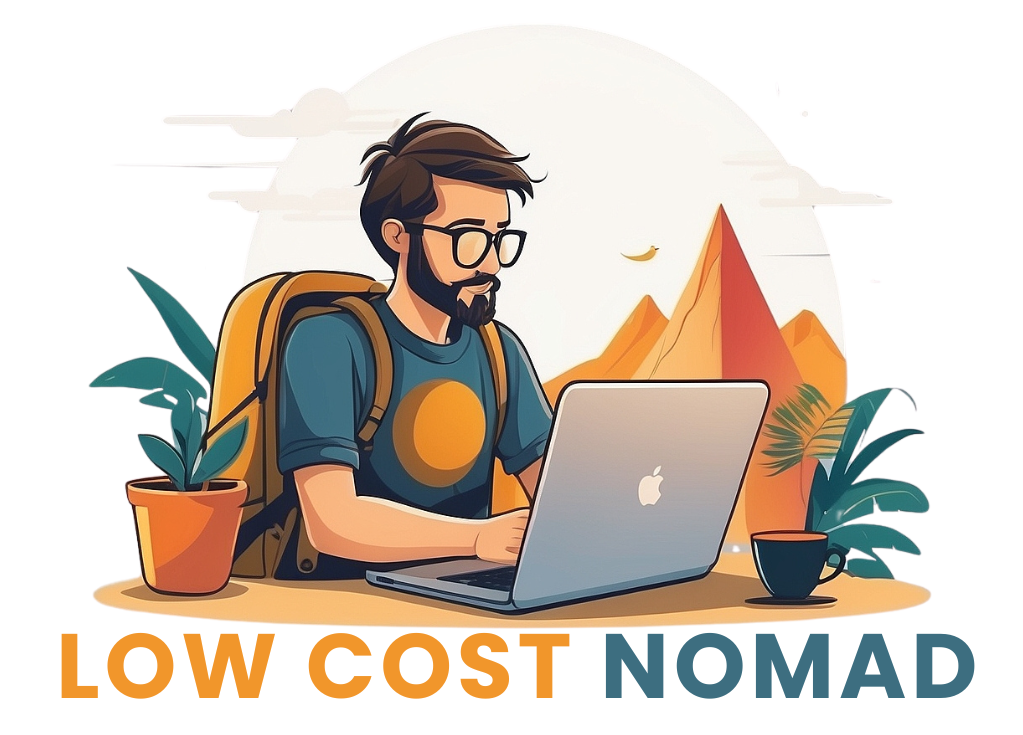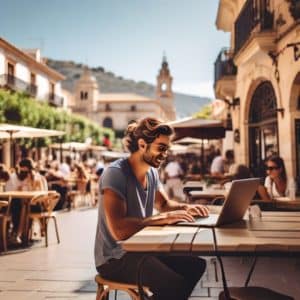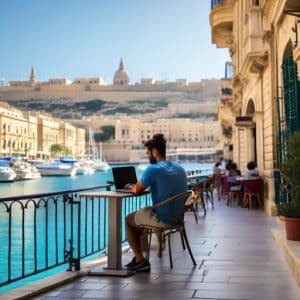The dream of being a digital nomad is exciting. Imagine working from a beach in Thailand, a cafe in Paris, or a co-working space in Medellín. This lifestyle offers incredible freedom and new experiences. But living and working from different corners of the world comes with its own set of challenges, and one of the most important ones is staying safe online.
When you’re constantly hopping from one country to another, you’ll likely connect to many different Wi-Fi networks: hotel Wi-Fi, cafe hotspots, airport networks, and maybe even public libraries. While convenient, these public connections can be risky. Your personal information, your work data, and your online activity can be exposed to others. This is where VPNs for digital nomads become absolutely necessary.
A Virtual Private Network, or VPN, is like a protective shield for your internet connection. It helps you stay private, secure, and in control of your data no matter where you are in the world. For anyone living the digital nomad life, understanding and using a reliable VPN is not just a good idea – it’s a fundamental part of staying safe and productive.
In this article, we’ll explain exactly what a VPN is, why it’s so important for digital nomads, how it works in a simple way, what features to look for when choosing one, and give you some practical tips for using a VPN effectively on your travels. By the end, you’ll understand why VPNs for digital nomads are an essential tool for your online safety while abroad.
What Exactly is a VPN? (The Simple Explanation)
Let’s break down what a VPN is without getting too technical. VPN stands for Virtual Private Network. Think of the internet as a big, open highway where everyone can see the cars (your data) driving by.
When you use a VPN, it’s like you’re building a private, encrypted tunnel from your device (your laptop, phone, or tablet) to the internet. Your data travels through this secure tunnel. Nobody outside the tunnel can see what you’re doing, like what websites you’re visiting, what files you’re sending, or what information you’re typing in.
Here are the two main things a VPN does:
- Encrypts Your Data: It scrambles your information so that even if someone *did* manage to intercept it, they couldn’t read it. It would just look like meaningless code. This is super important when you’re on networks you don’t trust.
- Hides Your Real Location (IP Address): Every device connected to the internet has an IP address, which is like its unique online address. This address can often reveal your general location. When you use a VPN, it replaces your real IP address with the IP address of the VPN server you’re connected to. So, to websites and services, it looks like you’re accessing the internet from the location of the VPN server, not your actual physical location.
In short, a VPN makes your online activity private and secure, like putting a lock on your data and making it appear as if you’re browsing from a different place.
Why Digital Nomads Absolutely Need a VPN
Okay, now that you know what a VPN is, let’s talk about why it’s not just a nice-to-have, but a must-have for anyone working and traveling remotely.
Public Wi-Fi is a Hacker’s Playground
As a digital nomad, you’ll spend a lot of time connecting to Wi-Fi in cafes, airports, train stations, hotels, and public spaces. These networks are convenient, but they are also notoriously insecure. Why?
- Easy to Eavesdrop: On many public Wi-Fi networks, especially those without a password, it’s relatively easy for someone with the right tools to ‘listen in’ on the data being sent between your device and the internet. They can potentially see your usernames, passwords, emails, and other sensitive information. This is sometimes called a “Man-in-the-Middle” attack.
- Fake Hotspots: Hackers can set up fake Wi-Fi networks with names similar to legitimate ones (like “Free Airport Wi-Fi”). If you connect to their network, they can easily steal your data or infect your device with malware.
- Malware Distribution: Sometimes, public networks themselves can be compromised and used to spread viruses or other harmful software to connected devices.
When you use a VPN on public Wi-Fi, your data is encrypted before it leaves your device. So, even if a hacker is on the same network and manages to grab your data packets, they won’t be able to read them. It’s like they’ve intercepted a locked box they can’t open. This protection is one of the primary reasons VPNs for digital nomads are so crucial.
Keeping Your Personal and Work Data Safe
Your laptop and phone contain a lot of sensitive information. This includes:
- Bank account details and login credentials
- Credit card information
- Work-related emails, documents, and sensitive client data
- Personal messages and private photos
- Login details for social media and other online accounts
When you access this kind of information, especially over an unsecured network, you are putting it at risk. A VPN encrypts your connection from end to end, making it much harder for anyone to steal this valuable data. Whether you’re checking your bank balance, sending a confidential work email, or making an online payment, a VPN adds a critical layer of security.
For digital nomads, protecting their work data is non-negotiable. A data breach could not only compromise sensitive client information but also damage their reputation and livelihood. Using a VPN ensures that your remote work activities remain private and secure.
Maintaining Your Online Privacy
Beyond just security from hackers, VPNs help you maintain your online privacy. When you connect to the internet without a VPN, your internet service provider (ISP) – or the provider of the public Wi-Fi network you’re using – can often see which websites you visit and what you do online.
While this might not seem like a big deal sometimes, this data can be logged, stored, or even sold to advertisers. In some countries, governments also monitor internet activity. If you prefer your online habits to remain private – and most digital nomads do – a VPN helps by masking your activity. Since your data goes through the encrypted tunnel to the VPN server, your local ISP or network provider only sees that you’re connected to the VPN server, not what you’re doing beyond that point (as long as you choose a good VPN with a strong privacy policy).
This aspect of online privacy is increasingly important in a world where tracking and data collection are widespread. VPNs for digital nomads help you browse the web without feeling like you’re constantly being watched.
Accessing Your Favorite Content From Anywhere
One common frustration for travelers is hitting “geo-restrictions.” This means that certain websites, streaming services (like Netflix, Hulu, BBC iPlayer), news sites, or even online stores show different content or block you entirely based on your geographical location.
For example, the movies and TV shows available on Netflix differ from country to country. You might want to access the library from your home country, but find it’s not available when you’re abroad. Or you might need to access a website that is blocked in the country you are currently visiting.
Since a VPN hides your real IP address and makes it appear as though you are browsing from the location of the VPN server, you can use it to bypass these geo-restrictions. By connecting to a VPN server in your home country, you can access content as if you were physically there. This is a popular use case for VPNs for digital nomads who want to stay connected to their favorite entertainment or services from home.
Bypassing Internet Censorship
In some countries, the internet is heavily censored. Governments might block access to social media platforms, news websites, communication apps, or other content they deem undesirable. This can make it difficult for digital nomads to communicate with friends and family, access information, or use essential work tools.
A VPN can help bypass this censorship. By connecting to a server in a country with a free and open internet, you can often access websites and services that are blocked in your current location. This capability is essential for digital nomads traveling in places with strict internet controls, allowing them to maintain communication and access information freely.
So, whether it’s for security, privacy, or freedom of access, the reasons why VPNs for digital nomads are essential are clear. They protect you from common online threats and give you more control over your internet experience.
How Does a VPN Actually Work? (A Slightly Deeper Look)
We covered the basic idea of a tunnel and encryption, but let’s look a little more closely at the steps involved when you use a VPN.
- You Open the VPN App: You open the VPN application on your device and choose a server location you want to connect to (e.g., a server in the US, Germany, Japan, etc.).
- Your Device Connects to the VPN Server: Your device establishes a secure, encrypted connection to the VPN server you selected. This is the “tunnel” we talked about.
- Your Data is Encrypted: Before your data (like a request to visit a website) is sent through the tunnel, the VPN software on your device encrypts it. This means it scrambles the data so it’s unreadable to anyone who might intercept it.
- Data Travels Through the Tunnel: The encrypted data travels securely over the public internet to the VPN server.
- VPN Server Decrypts and Forwards Data: The VPN server receives the encrypted data, decrypts it (unlocks the scrambled code), and then sends the request to the final destination on the internet (e.g., the website you want to visit).
- Response Travels Back Through the Tunnel: The website or service you contacted sends the information back to the VPN server. The server encrypts this information again and sends it back to your device through the secure tunnel.
- Your Device Decrypts Data: Your VPN software receives the encrypted data and decrypts it so you can see it normally on your screen.
From the perspective of the website or service you visited, the request originated from the VPN server’s IP address, not yours. This is how the VPN masks your location and activity. This secure process is the backbone of the protection offered by VPNs for digital nomads.
Choosing the Best VPN for Your Digital Nomad Journey
Not all VPNs are created equal. When you’re relying on a VPN for your online safety while traveling, you need to choose a good one. Here are the key features to look for:
Key Features to Look For:
- Strong Security and Encryption: This is the most important feature. Look for VPNs that use strong encryption standards (like AES-256) and secure protocols (like OpenVPN, WireGuard, or IKEv2).
- Strict No-Logs Policy: A “no-logs” VPN means the service does not keep records of your online activity (like which websites you visit, when you connect, your IP address). This is crucial for privacy. If the VPN doesn’t log your activity, they can’t hand it over to anyone, even if asked.
- Fast Speeds and Reliable Connection: VPNs can sometimes slow down your internet speed because your data is taking an extra step through the server and being encrypted. Good VPNs minimize this effect. Look for services known for speed and reliable connections, which are vital for remote work tasks like video calls or large file transfers.
- Large Server Network: A VPN with many servers in different countries gives you more options for masking your location and bypassing geo-restrictions. More servers also mean less load on each server, which can lead to faster speeds.
- Ease of Use: The VPN app should be easy to install and use on your devices, whether it’s your laptop, smartphone, or tablet. A simple interface means you’re more likely to use it consistently.
- Device Compatibility: Make sure the VPN offers apps for all the devices you use (Windows, macOS, iOS, Android). Some VPNs also offer browser extensions or can be set up on a router.
- Simultaneous Connections: If you use multiple devices (laptop, phone, tablet) or travel with a partner, check how many devices can be connected to the VPN simultaneously under a single account.
- Customer Support: Good customer support can be very helpful if you run into technical issues, especially when you’re in a different time zone. Look for providers with 24/7 support, ideally via live chat.
- Price: While you shouldn’t just pick the cheapest option (see below!), consider the price relative to the features offered. Most reputable VPNs require a paid subscription, but they offer much better service and security than free options.
Why Free VPNs Can Be Risky:
You might see ads for “free VPNs,” but be very cautious. Running a reliable VPN service with many servers, strong security, and fast speeds is expensive. If a VPN service isn’t charging you money, how are they making it?
- Selling Your Data: Many free VPNs collect and sell your browsing data to advertisers or other third parties. This completely defeats the purpose of using a VPN for privacy!
- Weak Security: Free VPNs often use weaker encryption or outdated protocols, leaving your data vulnerable.
- Injecting Ads or Malware: Some free services might inject ads into your browsing or even contain malware.
- Slow Speeds and Data Limits: Free VPNs typically have limited servers, slow speeds, and data caps, making them impractical for remote work or streaming.
For a digital nomad who relies on a secure and reliable connection for work and personal safety, paying for a reputable VPN service is a necessary investment. The cost is usually quite low compared to the potential risks of using an insecure connection.
Choosing the right VPN is a critical step in ensuring online safety while abroad. Do your research, read reviews, and pick a provider that meets the needs of the digital nomad lifestyle.
Real-Life Examples: When Your VPN Saves the Day
Let’s look at a few scenarios where a VPN comes in handy for a digital nomad:
- Working from a Cafe on Public Wi-Fi: You’re in a busy cafe, connected to their free Wi-Fi. You need to log into your work portal to access important documents and send an email with sensitive client information. Without a VPN, anyone else on that same network could potentially intercept your login details and read your email. With a VPN, your connection is encrypted, making your activity unreadable to others on the network. Your work data is safe.
- Accessing Your Online Banking: You need to transfer money or check your bank balance while sitting in a hotel lobby using their Wi-Fi. Banking details are highly sensitive. Connecting to your bank’s website through an encrypted VPN connection ensures that your account numbers, passwords, and transaction details are protected from prying eyes on the hotel network.
- Streaming Your Favorite Shows: You’ve finished work and want to relax by watching a show on your streaming service from back home. But you get an error message saying the content isn’t available in your current country. You connect to a VPN server in your home country, refresh the page, and suddenly the full library is available to you.
- Using Social Media in a Restricted Country: You’re traveling through a country where social media platforms like Facebook, Twitter, or Instagram are blocked by the government. You use your VPN to connect to a server outside that country, and now you can access your social media accounts and communicate freely.
- Booking Flights and Accommodation: Sometimes, websites show different prices based on your location. While not guaranteed, connecting to a VPN server in a different country might occasionally reveal cheaper deals on flights or hotels, allowing you to potentially save money.
These examples show the practical benefits and daily use cases of VPNs for digital nomads. They aren’t just for extreme security threats; they improve your everyday online experience by providing privacy, security, and access.
Are There Any Downsides? (And How to Deal With Them)
While VPNs are incredibly beneficial, there are a few potential minor downsides:
- Slight Speed Reduction: Because your data has to travel to the VPN server and be encrypted/decrypted, your internet speed might be slightly slower than connecting directly. Reputable VPNs minimize this, but it’s something to be aware of. For most tasks like browsing, email, and even streaming, a good VPN’s speed is perfectly adequate. High-bandwidth activities like large file uploads might take a little longer.
- Some Websites May Block VPNs: Certain websites or services, particularly streaming platforms or some banking sites, try to detect and block VPN connections to enforce geo-restrictions or for security reasons. Good VPN providers constantly update their systems to try and bypass these blocks, and connecting to a different server often solves the issue.
- Cost: As mentioned, reliable VPNs require a paid subscription. However, the cost is usually very reasonable, especially when you consider the value they provide in security, privacy, and access. It’s an investment in your digital well-being.
- Legality: In most countries, using a VPN is perfectly legal. However, in a few countries with strict internet censorship (like China, Russia, etc.), the legality can be complicated, and using unauthorized VPNs might be restricted or illegal. Always research the local laws of the country you are visiting. Even in such countries, tourists and expats often use reputable commercial VPNs, but it’s important to be aware of the local situation.
Overall, the benefits of using VPNs for digital nomads far outweigh these minor drawbacks, and most issues can be easily managed.
Tips for Getting the Most Out of Your VPN
To make sure you’re getting the best protection and experience from your VPN, follow these simple tips:
- Always Connect on Public Wi-Fi: Make it a habit to connect to your VPN *before* you do anything else on a public network in a cafe, airport, hotel, etc.
- Enable Auto-Connect: Most VPN apps have a setting to automatically connect whenever your device joins an unknown Wi-Fi network. Turn this on!
- Choose the Right Server: Select a server location based on your needs – close to your physical location for best speed, or in a specific country to access geo-restricted content there.
- Use Strong Security Protocols: In the VPN app settings, choose modern and secure protocols like OpenVPN, WireGuard, or IKEv2 if available.
- Verify the No-Logs Policy: When choosing a VPN, make sure their no-logs policy is clear and preferably audited by an independent third party.
- Use the Kill Switch Feature: Many good VPNs offer a “kill switch.” This feature automatically disconnects your device from the internet if the VPN connection drops unexpectedly. This prevents your real IP address and data from being exposed even for a moment. Make sure this is enabled.
- Keep the App Updated: Regularly update your VPN application to ensure you have the latest security features and bug fixes.
- Use It on All Your Devices: Don’t just use the VPN on your laptop. Install and use it on your smartphone and tablet too, especially since you’ll likely connect these devices to public Wi-Fi as well.
By following these tips, you can significantly enhance your online safety while abroad and make your digital nomad journey smoother and more secure.
Conclusion: Don’t Travel Without Your Digital Shield
Living as a digital nomad offers unparalleled freedom and adventure. You get to explore new cultures, see amazing sights, and work from anywhere in the world. But with this freedom comes the responsibility of protecting yourself, not just physically, but also online.
Connecting to public Wi-Fi networks without protection exposes your sensitive data to potential hackers and puts your privacy at risk. Geo-restrictions can prevent you from accessing essential services or enjoying entertainment from home. In some places, censorship can limit your access to information and communication.
This is why VPNs for digital nomads are an indispensable tool. A reliable VPN provides the security of encryption, the privacy of IP masking, and the freedom to access content from anywhere by bypassing geo-restrictions and censorship. It’s your personal, portable digital shield.
Choosing a quality paid VPN service with strong security, a strict no-logs policy, fast speeds, and a large server network is one of the smartest investments you can make for your digital nomad lifestyle. Avoid free VPNs, which often compromise your security and privacy instead of enhancing them.
Using a VPN consistently – especially on public Wi-Fi – should become as natural a part of your routine as packing your passport or charging your devices. It protects your work, your finances, your identity, and your freedom to connect and access information online.
So, if you’re living the digital nomad dream, or planning to start, make sure a reliable VPN is at the top of your list of essential tools. Stay safe, stay private, and enjoy your journey around the world!




